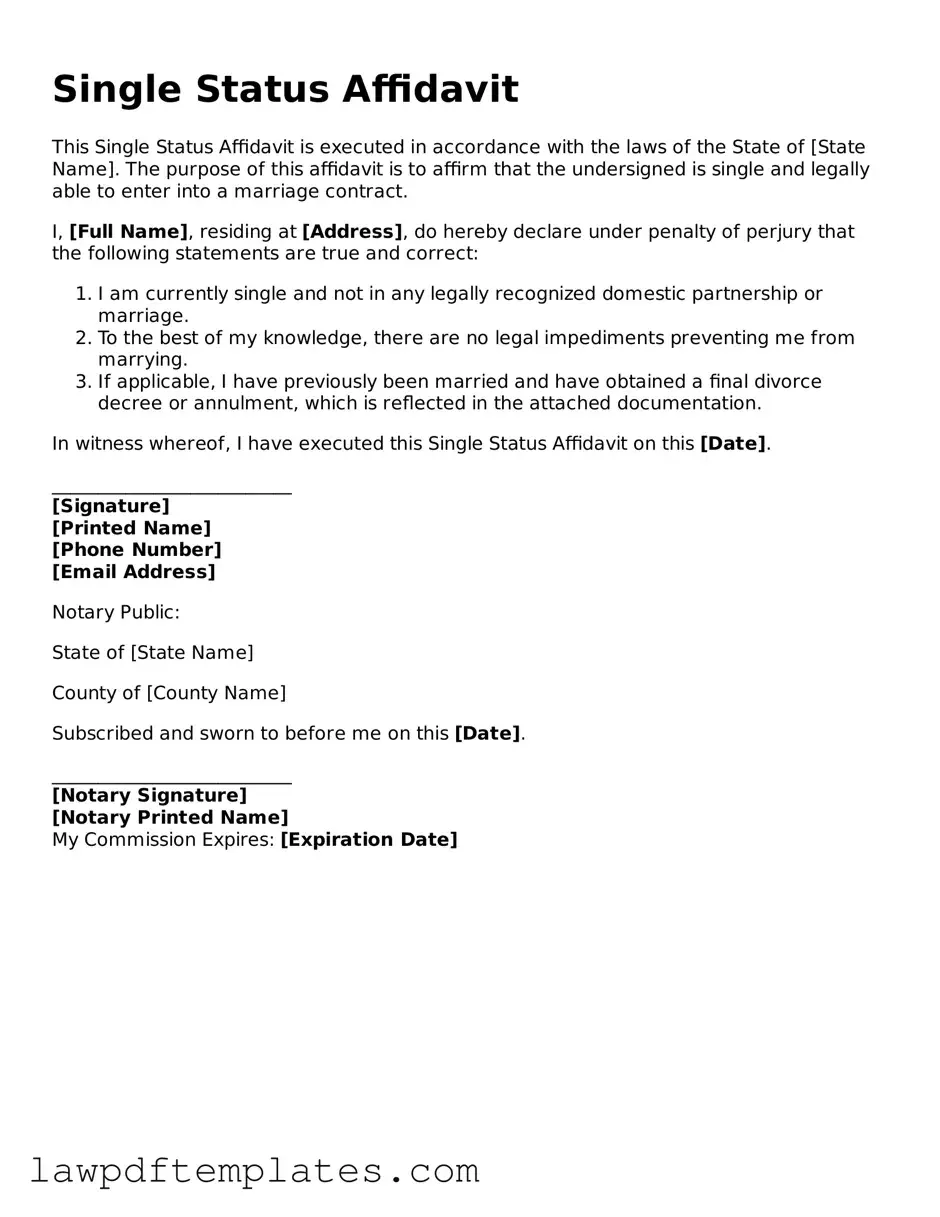Attorney-Approved Single Status Affidavit Document
Form Breakdown
| Fact Name | Details |
|---|---|
| Definition | A Single Status Affidavit is a legal document affirming an individual's single status, often required for marriage in a foreign country. |
| Purpose | This affidavit serves to confirm that a person is not currently married, which is necessary for certain legal processes, particularly international marriages. |
| Notarization | Typically, the affidavit must be notarized to verify the identity of the signer and the authenticity of the document. |
| Governing Law | In the United States, the requirements for a Single Status Affidavit may vary by state. For example, California law requires specific wording and notarization. |
| Required Information | The form usually requires the individual's full name, date of birth, and a statement affirming single status. |
| Usage in Foreign Countries | Many countries require this affidavit as part of the marriage application process, especially if the couple is from different nations. |
| Validity Period | Some jurisdictions may have a specific validity period for the affidavit, often ranging from 30 to 90 days. |
| Additional Documentation | Some states may require additional documents, such as identification or proof of residency, to accompany the affidavit. |
| Language Requirements | If the affidavit is to be used in a non-English speaking country, a certified translation may be required. |
| Filing Requirements | In some cases, individuals may need to file the affidavit with a government agency, depending on local laws and regulations. |
Sample - Single Status Affidavit Form
Single Status Affidavit
This Single Status Affidavit is executed in accordance with the laws of the State of [State Name]. The purpose of this affidavit is to affirm that the undersigned is single and legally able to enter into a marriage contract.
I, [Full Name], residing at [Address], do hereby declare under penalty of perjury that the following statements are true and correct:
- I am currently single and not in any legally recognized domestic partnership or marriage.
- To the best of my knowledge, there are no legal impediments preventing me from marrying.
- If applicable, I have previously been married and have obtained a final divorce decree or annulment, which is reflected in the attached documentation.
In witness whereof, I have executed this Single Status Affidavit on this [Date].
__________________________
[Signature]
[Printed Name]
[Phone Number]
[Email Address]
Notary Public:
State of [State Name]
County of [County Name]
Subscribed and sworn to before me on this [Date].
__________________________
[Notary Signature]
[Notary Printed Name]
My Commission Expires: [Expiration Date]
Common mistakes
Completing a Single Status Affidavit form can be a straightforward process, but many individuals encounter pitfalls that can lead to delays or complications. One common mistake is providing inaccurate personal information. This includes misspellings of names, incorrect dates of birth, or wrong addresses. Such errors can raise questions about the validity of the affidavit and may require additional verification steps, causing unnecessary delays.
Another frequent error involves failing to sign the document correctly. Some people overlook the importance of signing in the designated areas or neglect to have their signature notarized. A signature that is missing or improperly placed can render the affidavit invalid. Notarization is often a crucial step, as it adds a layer of authenticity to the document.
Additionally, individuals sometimes forget to include necessary supporting documents. Depending on the requirements of the jurisdiction, you may need to provide identification or proof of residency. Omitting these documents can lead to rejection of the affidavit or requests for further information, prolonging the process.
Finally, misunderstanding the purpose of the affidavit can lead to mistakes. Some individuals may not realize that the affidavit is a legal declaration of their single status, which must be true and accurate. Misrepresenting one’s status can have serious implications, especially if the affidavit is used for marriage or immigration purposes. It’s crucial to understand the significance of the information being provided and to ensure its accuracy.
Consider Popular Types of Single Status Affidavit Documents
What Is an Affidavit of Affixture - Legal document establishing a mobile home as real property.
An affidavit form is a crucial document in various legal proceedings, as it provides a formal declaration of facts made under oath. By using an affidavit form, individuals can assert the truthfulness of their statements, significantly contributing to the integrity of legal processes. For those seeking to familiarize themselves with different types of affidavits, All Affidavit Forms are available for reference and usage, ensuring that proper procedures are followed.
What Is Self Affidavit - The Self-Proving Affidavit is an efficient way to strengthen a will's enforceability.
Residence Affidavit - Affidavit of Residency is often needed by social service agencies to verify eligibility.
